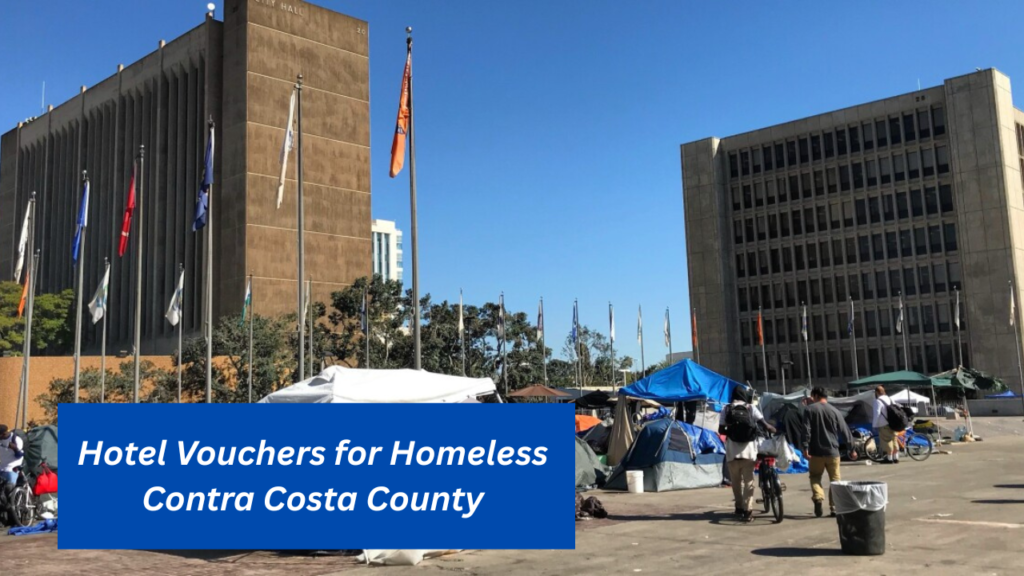Homelessness is a growing problem in California, and Contra Costa County is no exception. Rising rents, job losses, and limited access to affordable housing leave many individuals and families without a stable place to live. To address this crisis, local organizations, county agencies, and faith-based groups are offering hotel vouchers to homeless individuals and families in Contra Costa County. These vouchers provide temporary housing and supportive services while individuals seek long-term housing solutions.
What Are Hotel Vouchers for the Homeless?
Hotel vouchers are prepaid coupons or authorizations that allow homeless individuals and families to stay in a hotel or motel for a short period. Unlike shelters, hotels offer privacy, security, and dignity, making them especially useful for families with children, seniors, or people with medical needs.
They are typically distributed in cases such as:
- Extreme weather emergencies (heat waves, storms, or freezing nights)
- Families with children are unable to find shelter space
- Domestic violence survivors who need immediate safe housing
- Medical or crisis situations where traditional shelters are not suitable
These vouchers typically cover short stays, from one night to several weeks, depending on funding and availability.
Who Provides Hotel Vouchers in Contra Costa County?

Contra Costa Crisis Center
Provides emergency motel vouchers to homeless families with children and to homeless individuals with a viable plan to cope. Homeless individuals or families often need case management and a plan to address their housing situation.
SHELTER, Inc.
Among its homelessness prevention and rehousing services, it may provide motel or hotel vouchers (temporary housing) for homeless individuals. Homeless individuals, especially low-income individuals, have limited housing options. This often requires coordination with case managers from nonprofit organizations.
Homeless LGBTQ Youth in Transition Program (Rainbow Community Center)
Provides temporary housing, including motel vouchers, transportation, relocation funds, etc., for homeless or at-risk youth (ages 18-24). They must meet age criteria. They also typically require participation in a service plan.
CalWORKs Homeless Assistance (HA)
State program through the California Department of Social Services: Includes “Temporary HA,” which helps with temporary housing costs, including hotel or motel accommodations. Provides up to 16 days of temporary housing once every 12 months (with certain exceptions). The rate is specified (e.g., ~$85/day for a family of 4 or fewer + additional for each additional member). Eligible CalWORKs recipients/applicants who are experiencing homelessness or at risk must meet state/local criteria. Eligibility verification is generally required.
Health, Housing & Homeless Services (H3), Contra Costa County
Contra Costa Health Services’ H3 division integrates several housing and services programs for people experiencing homelessness; one of its offerings is referrals and assistance, which may include housing options. While the direct provision of vouchers may depend on funding and local case managers, they are a key point for accessing support in hotels and motels. For people experiencing homelessness or severe housing instability, these are generally managed through Coordinated Entry or the CARE Center system.
211 / CORE Outreach / Coordinated Entry
These systems/frameworks do not always issue vouchers directly, but they connect people with providers who do and can assist with emergency motel vouchers. CORE Outreach Teams assist unsheltered individuals with referrals to needed resources. Anyone in the county who calls 211, goes to a CARE Center, or contacts CORE Teams may require case management.
Contra Costa Employment and Human Services Department (EHSD)
The EHSD offers several programs under its Housing and Homelessness Services umbrella. While many of its services include rental assistance, part of its emergency shelter support and prevention may include hotel or motel voucher options through partner agencies. Individuals who apply through the EHSD meet income requirements or are identified through the homeless system as needing shelter.
How to Apply for Hotel Vouchers in Contra Costa County
To apply for hotel vouchers, you must contact local agencies and nonprofit organizations that provide services for homeless people:
Call Contra Costa 211: By dialing 211, you can contact local resources and be referred to agencies that issue vouchers.
Contact Contra Costa Health Services (H3): Their Coordinated Entry System helps determine eligibility and placement in housing or emergency programs.
Contact nonprofit organizations: Organizations such as Shelter, Inc., and GRIP can sometimes provide vouchers when shelters are unavailable.
Emergency situations: In cases of domestic violence or urgent crises, contacting local hotlines, law enforcement, or crisis centers may result in assistance with hotel vouchers.
Who Qualifies for Hotel Vouchers for the Homeless in Contra Costa County
Eligibility depends on the program and funding source, but common requirements include:
- Currently being homeless or at immediate risk of becoming homeless.
- Priority is typically given to families with children, seniors, or people with disabilities.
- Survivors of domestic violence are in need of emergency shelter.
- People experiencing health crises are unable to safely stay in shelters.
- Low-income individuals who meet specific program guidelines.
Since resources are limited, vouchers are generally issued based on urgency and vulnerability.
Limitations of Hotel Voucher Programs
While these programs provide immediate assistance, they are typically temporary, ranging from one night to several weeks. Availability depends on funding, donations, and seasonal demand. Not all applicants will receive a voucher, so it is important to contact multiple agencies for assistance.
Conclusion
Hotel vouchers for homeless people in Contra Costa County serve as a critical safety net for individuals and families facing housing instability. While they are not a permanent solution, they provide immediate shelter, safety, and stability during difficult times. By connecting with local agencies, nonprofits, and faith-based organizations, those in need can find temporary relief and begin working toward long-term housing solutions.


